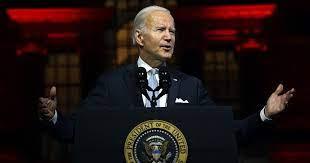
"It’s not just Trump, it’s the entire [extreme MAGA] philosophy that underpins [it]….it’s like semi-fascism."
Biden did not say those words in his “Soul of the Nation” speech in Philadelphia last night; contrary to the expectations of some, the word “fascism” made no appearance whatsoever. But he did say them at a fundraiser last week, and you’d have to be a complete pedant to look at a speech where the President of the United States calls out Donald Trump by name, and states that he and his closest MAGA followers “do not respect the Constitution….do not believe in the rule of law….[and] do not recognize the will of the people,” and not see an accusation of the former president and his cult as, at the very least fascist-adjacent. Borrowingfrom my far more consistently radical friend Matt Stannard, I agreed back in 2020 that Trump was an “incipient fascist figurehead.” In the wake of the many revelations about his equanimity about, if not outright support for, the January 6 attack on the Capitol building, I think he still is, so I am delighted that Biden has more or less said so, whatever the dangers of that rhetoric may be. Words matter, after all, Trump’s most assuredly.
I wouldn’t blog if I wasn’t at least somewhat pedantic at heart myself, though, so let me throw out this: at the heart of Biden’s condemnation of Trump and the MAGA movement as fascist-adjacent is his claim, as I wrote above, of their not respecting the U.S. Constitution, not respecting the rule of law, and not respecting the will of the people, and those three accusations--while obviously, especially as an ordinary matter of practice in the United States of America in 2022, having significant overlap—are not entirely contiguous with each other, either historically or theoretically. So partly as a critique of Biden’s fine-if-not-excellent speech, but mostly as hopefully a support to it, let me say something—one long point, and then two briefer ones—about each of those, for anyone who cares.

Obviously, this is an argument for a "living" or a "progressive" understanding of the constitutions have emerged, over the past few centuries, as the primary governmental foundations for liberal capitalist societies (and, thanks to globalization and/or Western imperialism, much of the non-liberal, non-capitalism world as well). Making use of the writings of Sheldon Wolin as I havebefore, I would prefer to call this a "performative" understanding of constitutions, which sees them as (sometimes intentional, more often unintentional) repositories of the democratic tension between, on the one hand, a contractual basis for the ordering of the demos, the people who live in a particular place and have some kind of imagined communitywith each other, and on the other hand, the practices, rituals, and norms which are seen as appropriately embodying the operational details of that contract. What this means is that our understanding of or expectations for what counts as an acceptable constitutional performance can get legitimately away from the legal specifics of the contract itself. Which is why saying that something is “legal, but unconstitutional” is, in my opinion, not at all incoherent, and why accusations of acting unconstitutionally (plenty of which can be, have been, and should continue to be made against Trump, but which can also, I think, be brought mostly justifiably against pretty much every other President of the United States in my lifetime) shouldn’t be so much an occasion for a total political freak-out as a reminder that constitutions should often be adjusted to reflect the democratic will contained, however imperfectly, within contemporary legislative action. (The TLDR version of the above paragraph: while I agree that parliamentarianism has many problems, I don’t think it has nearly as many as America’s currently quite dysfunctional attempts at constitutional democracy does.)
Of course, neither former President Trump nor, to my knowledge, any of his most active and obvious MAGA cronies have seriously talked about constitutional reforms relevant to anything I’ve just written here, and despite regularly paying my Democratic Socialists of America dues, I have to say I’m still very much on the side of the old leftists who I think cogently argued against many DSA members back in 2020 that there is no democratic upside to whatever constitutional destruction Trump’s incompetence and norm-shattering may “accidentally” achieve. So when it comes to MAGA Republicans “not respecting the Constitution,” while I don’t consider that in itself necessarily a fascist-adjacent horror (I mean, if it was, then strictly speaking Jefferson was arguably fascist-adjacent too), the manner of their disrespect for it is not at all constructive and democratically empowering, but is something to be frightened of instead.
The reasons why that fear is justified, and thus the real reasons why Biden’s accusations are appropriate, comes in the two other accusations he bundles with the one about not respecting the U.S. Constitution: not respecting the rule of law, and not respecting the outcome of elections. That Trump has been, at best, cavalier about adhering to the law, and often downright contemptuous of doing so, is not just clearly evidenced by his entire career as a grifter and a liar, but has been explicitly demonstrated by everything the FBI has compiled about his theft of classified documents, which honestly is just the latest controversy du jour for him. At this point, I really think the only way anyone can coherently not admit that Trump’s presidency was absolutely an incidence of democratically dangerous, Nixon-level “when the president does it, that means it is not illegal” hubris, is to simply admit to themselves that they are an utter Deep State paranoiac and start making plans immediately to move to southwestern Montana, stop paying taxes, get off the grid entirely, and begin drilling with their (probably mostly white supremacist) friends for what they must clearly hope will be a new, violent revolution very soon. I can imagine someone coherently arguing “well, that actually describes every president ever—they’re all power-mad crooks, most especially our current one--so I guess I’ll just tough it out under the boot-heel of tyranny right where I aml”; I think that conclusion is stupid and nigh-impossible to defend, but at least it’s coherent. But to go forward not thinking, post-January 6, that Trump and at least a significant minority of his MAGA followers are accepting of illegality and dishonesty and corruption? To not accept—and, in fact, for ideological reasons be at peace with— the charge that Trump has transformed of much of the Republican party into apologists for criminality, as Representative Liz Cheney and other (though not nearly enough) Republicans have warned? That’s just, once again, really damn dangerous. One can—and I think should—have serious philosophical concerns, whether from a libertarian or a radical democratic or an anarchist perspective (and I definitely am sympathetic to at least the lattertwo), with the pathologies that an over-reliance on the coerciveness of law produces, and yet not drink so much own-the-libs Kool-Aid as to forget that the admittedly often bourgeois ends which the law, in its clumsy majesty, serves are actually pretty valuable, and worth preserving.
And that, of course, means election laws as well. This is getting to the point that I’m repeating myself, so let me just wrap it up with this: do I think the Electoral College, as a means of determining which individual should be invested with presidential authority under our constitutional system, kind of sucks? Yes, I absolutely do think so. I wish it were entirely scrapped. (But I also wish our country, indeed the whole world, were governed by a confederal system of environmentally sustainable, mostly autarkic egalitarian communes and ward republics which operate on the basis of a combination of direct democracy and proportional representation, and if wishes were ponies, we’d all be Belle Warring.) But in any case, given its current place in America’s electoral system, any person with an at-least-grudging respect for the rule of law--and more importantly, I think, any desire to not see mostly mindlessly constitutional-norm-trashing grifters violently stay in power, or at least stay politically relevant, despite what the elections results clearly said—ought to pay more attention to the political process of representative democracy it is woven into, something which back in early 2021, to their shame, 147 Republicans refused to do. Which is why, after a lot of (I think mostly irrelevant and politically questionable) legislative boasting, Biden’s concluding focus on the elections two months from now was absolutely on point:
Our task is to make our nation free and fair, just and strong, noble and whole. And this work is the work of democracy—the work of this generation. It is the work of our time, for all time. We can’t afford to have…anyone on the sidelines. We need everyone to do their part. So speak up. Speak out. Get engaged. Vote, vote, vote!
And if we all do our duty—if we do our duty in 2022 and beyond, then ages still to come [people] will say we—all of us here—we kept the faith. We preserved democracy. We…heeded not our worst instincts, but our better angels. And we proved that, for all its imperfections, America is still the beacon to the world, an ideal to be realized, a promise to be kept.
There is nothing more important, nothing more sacred, nothing more American. That’s our soul. That’s who we truly are. And that’s who…we must always be.
Do I love these kinds of constitutional myths about America exceptionalism? Substantively, no. But as a matter of political rhetoric, as a tool to encourage engagement with our flawed democratic processes, and most importantly engagement with our flawed fellow citizens (a description which most assuredly includes myself and anyone who reads this)? Actually, I think I kind of do love them. Because I think they convey necessary truths. Pay attention to our President, everyone. Last night in Philadelphia, he was speaking truth, sometimes clumsily and un-eloquently, to a dangerous power, and it’s not often that the leader of an imperial state can honestly do that. (Thank goodness.)
